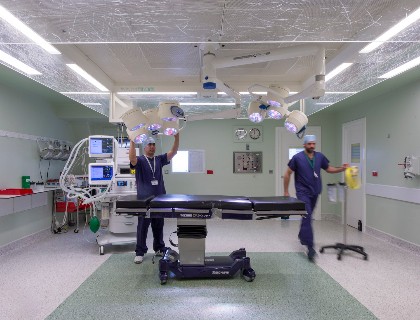Beyond the uniform: Andrew Robertson
FEATURE - 1ST DECEMBER 2016
In the latest in a series about the people who make King Edward VII's Hospital tick, we meet CEO Andrew Robertson
Having worked in private healthcare for about 25 years, the thing that attracted me to King Edward VII’s Hospital was its extraordinary reputation for quality of care. Even before I worked here, I was aware that it was one of the best private hospitals in the country. And, while it may not be common knowledge, the hospital is a registered charity. To be part of an organisation which runs a long-term charitable project was something that appealed to me a great deal.
My job is to lead the organisation and ensure we have the proper structures in place. On the clinical side, we have a matron and a medical director who I work closely with to ensure that our clinical governance is robust. I also have to make sure the hospital runs efficiently and brings in enough revenue to continue to invest in our people and technology.
As well as being an acute private hospital, King Edward VII’s has a charitable arm, the Sister Agnes Benevolent Fund, that has been running for over a century, and was set up to provide help for armed forces personnel and their families. Through the fund we provide an automatic 20 per cent discount on hospital costs for those who qualify. We also provide a grant system offering larger discounts to those in extra need. One of the things I realised when I joined King Edward VII’s was that we had the capacity to do more in this area. In fact, one of our trustees, Lieutenant General Sir William Rollo, has been involved with several charities who work with veterans, spreading the word that we are here and have the systems in place to identify veterans in need and support them. I am very glad to see that this is bearing fruit and there has been an increase in the number of people applying for subsidised treatment.

Theatre Nurse, King Edward VII's Hospital

Theatre, King Edward VII's Hospital
An example of the kind of work we are doing is a pain management programme we have launched with the charity Supporting Wounded Veterans, working with veterans whose injuries have left them in severe pain. The programme is led by Professor Andrew Baranowski, one of the world’s leading pain specialists. Working with the armed services is part of our DNA and everyone at the hospital believes it is a privilege to serve those who have suffered through serving us.
In more general terms, you can fall behind very quickly in healthcare as new techniques and treatments develop, so part of my job is to ensure that we maintain the personnel and infrastructure necessary to offer our patients and staff the best possible services and facilities in the coming years. For example, some surgical treatments that once required an overnight stay are now done on a day case basis, with the patient going home shortly afterwards. This kind of change places different demands on hospital facilities and I have to ensure we are in a position to respond to these changes.
Next year we will be starting a major redevelopment programme to create additional consulting suites, add more diagnostic and imaging facilities, extend our outpatient facilities and increase the number of operating theatres. A major part of my job at present is to shepherd this change through efficiently, without compromising our standards in any way.
We are also creating centres of excellence in various clinical specialities. We are in the process of developing our women’s health centre, which includes a specialist breast unit, and a multi-disciplinary pain management centre, which will move into a dedicated facility early next year. Other areas of speciality being built include orthopaedics, urology and ophthalmology.
One of the things I’m most proud of about the hospital is the way patients and former patients talk about us. They talk about the hospital with such love and passion because of what they feel we have given them, and how we have looked after them when they needed help. It pushes me to work hard to maintain that level of satisfaction, as well as reminding me what a privilege it is to work in this hospital.
-
FEATURE
Inside the Dermatology Treatment Centre at King Edward VII’s Hospital
An insight into the Dermatology Treatment Centre at King Edward VII’s Hospital: the joys of the job and common tasks
-
NEWS
King Edward VII’s Hospital first appearance at Arab Health 2017
Located within the Harley Street Medical Area, King Edward VII’s Hospital is a hospital famed for treating life threatening conditions